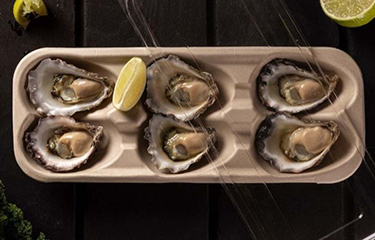Bondi Junction, New South Wales, Australia-based sustainable packaging developer BioPak has created the world’s first custom-molded oyster tray using sugarcane, with the help of its industry partner Blue Harvest.
A number of seafood farmers across Australia have been working with BioPak on formulating solutions to single-use packaging for the aquaculture sector. Blue Harvest – an Australian specialist seafood marketing agency working with producers of oysters, prawns, mussels, and pipis – reached out to the packaging firm seeking an alternative to the plastic-wrapped, single-use plastic trays currently being used to sell oysters.
The resulting sugarcane solution created by the companies is comprised of rapidly-renewable materials that would have otherwise been burned, BioPak said. The company said the new trays can help the aquaculture industry avoid plastics, improve ocean health, and reduce the sector’s environmental footprint.
“Biopak has been really responsive to our needs; a great company to work with,” Blue Harvest noted in a BioPak blog post. “Not only have they provided us with an alternative to the plastic tray, they have worked with us to design a completely new solution that looks and feels premium, and presents our oysters in a much better way. The number of single-use plastic trays currently used in Australia to sell oysters runs into the millions, and although we are in the early stages of the product's launch, this has massive potential to slash that use.”
According to BioPak, that potential could result in the elimination of 1.5 metric tons of plastic from waste streams annually.
The trays are compostable and align with the quickly-evolving sustainable needs of the seafood industry, particularly where oysters are concerned, Blue Harvest said.
“Being in the seafood industry our livelihoods depend on clean and healthy oceans. Seafood transportation does however have its challenges, as it is a highly temperature sensitive product that perishes quickly after harvest,” the agency said in the blog post. “The solution to this has historically been using materials like polystyrene to provide insulation, and plastics to waterproof. We are really trying to turn this on its head, and the BioPak tray is a huge part of this effort. We want to get our products to consumers faster, more regularly, and in packaging that is either compostable or fully recyclable in a quality condition that is not only as good as the old-school packaging approaches, but better. We don’t need oyster trays that last 100 years, as fresh oysters will be eaten within a week.”
Reception of the new trays has been positive in a number of ways, Blue Harvest said, with retailers, consumers, and fellow industry players all remarking on the packaging’s benefits.
“There has been a really warm embrace from many in the seafood industry for both Blue Harvest and BioPak for taking the initiative with this sustainable, premium looking packaging. We are seeing images of the product being shared via social media by those in the industry - both producers and customers,” Blue Harvest said. “We believe that the trays will not only give our customers the peace of mind that they are purchasing a product in sustainable packaging, but also give them confidence in the quality and freshness of the oysters as each lidded tray allows for minimal handling from the processor through to the consumer."
The trays serve to cut out a lot of waste and extra work for retailers as well, the firm noted.
“The packs have provided another benefit to our customers over and above providing a more sustainable solution. Historically, seafood retailers have had to take the plastic trays from their window when ordered, then wrap them in cling wrap, and then butcher paper, a process that takes time, causes waste, and leaves the product looking tacky. The handy clip on lid that comes with the new tray takes all of this process out, and really does leave the oysters looking their best,” it said.
Blue Harvest is working with the wild-capture and aquaculture producers it represents to promote third-party sustainability accreditation from either the Marine Stewardship Council or the Global Aquaculture Alliance’s Best Aquaculture Practices program.
“Oyster farming is an incredibly passive style of food production, as the oysters grow from consuming the natural food in their environment, and don’t require artificial feed inputs, which is one of the main reasons we want to get the final leg of their journey to people’s homes right,” Blue Harvest said.
Photo courtesy of BioPak and Blue Harvest







